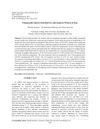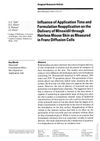 4 citations,
June 2011 in “Journal of Biomedical Research”
4 citations,
June 2011 in “Journal of Biomedical Research” Herbal extracts promoted hair growth similar to minoxidil in mice.
 9 citations,
February 2011 in “Revista Brasileira de Farmacognosia”
9 citations,
February 2011 in “Revista Brasileira de Farmacognosia” Tridax procumbens plant parts boost immune response in mice.
 9 citations,
March 2009 in “European Journal of Dermatology”
9 citations,
March 2009 in “European Journal of Dermatology” Schisandra nigra extract may help hair grow by stimulating cells and preventing hair follicle damage.
 98 citations,
May 2008 in “Archives of Dermatological Research”
98 citations,
May 2008 in “Archives of Dermatological Research” Eclipta alba extract helps hair grow faster and more effectively than minoxidil in rats.
 51 citations,
January 2001 in “Biological & Pharmaceutical Bulletin”
51 citations,
January 2001 in “Biological & Pharmaceutical Bulletin” The bark of Myrica rubra contains compounds that can block testosterone effects and might help prevent hair loss.
December 2007 in “한국미용학회지” The complex oriental medicine extract was as effective as minoxidil for hair regrowth in mice without adverse effects.
1 citations,
April 2022 in “Crystal Growth & Design” January 2010 in “대한미용학회지” Polygoni multiflori Radix water extracts promote hair growth in mice.
 48 citations,
December 2013 in “Drug Delivery and Translational Research”
48 citations,
December 2013 in “Drug Delivery and Translational Research” Niosomes improve minoxidil skin penetration for hair loss treatment.
4 citations,
May 2013 in “PubMed” Minoxidil in Espumil foam stays stable for at least 90 days at room temperature.
2 citations,
January 1986 in “PubMed” PIXE is an effective method to analyze hair's elemental composition.
26 citations,
June 2016 in “Frontiers in Plant Science” Autofluorescence can sort plant cells without labeling.
64 citations,
January 2001 in “Pharmacotherapy The Journal of Human Pharmacology and Drug Therapy” Misoprostol has many medical benefits, including protecting against injuries, aiding in disease treatment, and improving drug effects.
 1 citations,
January 2013
1 citations,
January 2013 About 20% of red foxes and jackals in western Iran have at least one type of ectoparasite, with fleas being the most common.
4 citations,
February 2015 in “PubMed” The emu oil emulsion with minoxidil was better at promoting hair growth than the commercial product.

Eclipta alba L. (Urang-Aring) can help treat hair loss.

The research found that nanoparticles coated with chitosan improved the skin penetration of the drug finasteride.
 5 citations,
January 1994 in “Skin Pharmacology and Physiology”
5 citations,
January 1994 in “Skin Pharmacology and Physiology” Minoxidil absorption in skin is slowed by cleansing, depends on how long it stays on the skin, and is not much affected by reapplication.
 July 2019 in “Majalah Obat Tradisional”
July 2019 in “Majalah Obat Tradisional” Green tea leaves extract with flavonoids can promote hair growth.
 1 citations,
September 2023 in “Applied sciences (Basel)”
1 citations,
September 2023 in “Applied sciences (Basel)” Ishige sinicola extract may help prevent muscle atrophy through its antioxidant and anti-inflammatory effects.
 1 citations,
November 2023 in “Naunyn-Schmiedeberg's archives of pharmacology”
1 citations,
November 2023 in “Naunyn-Schmiedeberg's archives of pharmacology” Henna has potential health benefits and can treat various conditions, but more research is needed to confirm safety and effectiveness.

Pimpinella anisum L. extract significantly boosts hair growth in mice.
7 citations,
June 2012 in “Journal of dairy science” Bovine milk fats applied to mouse skin can promote hair growth similar to known hair growth treatments.
July 2021 in “Journal of reports in pharmaceutical sciences” The 2% minoxidil nanosuspension is as effective as the commercial product but safer and easier to use.
 1 citations,
November 2022 in “DOAJ (DOAJ: Directory of Open Access Journals)”
1 citations,
November 2022 in “DOAJ (DOAJ: Directory of Open Access Journals)” Male and female human hairs have different microscopic structures that can help in forensic analysis.
 6 citations,
October 1993 in “Endocrinology”
6 citations,
October 1993 in “Endocrinology” Finasteride blocks progesterone production in specific tumor cells, potentially causing side effects.
 26 citations,
March 1985 in “International Journal of Dermatology”
26 citations,
March 1985 in “International Journal of Dermatology” Minoxidil helps hair growth, but results vary.
 11 citations,
April 1993 in “Chest”
11 citations,
April 1993 in “Chest” Man drank minoxidil, caused low blood pressure and fast heartbeat, treatment helped but led to heart damage.
 15 citations,
January 2015 in “Pharmaceutical Biology”
15 citations,
January 2015 in “Pharmaceutical Biology” Chrysanthemum zawadskii extract may be a better treatment for hair loss than Minoxidil.
 25 citations,
January 2013 in “Journal of Industrial and Engineering Chemistry”
25 citations,
January 2013 in “Journal of Industrial and Engineering Chemistry” Some herbal extracts, especially when used in cubosomal suspensions, were as effective as Minoxidil in promoting hair growth.




















